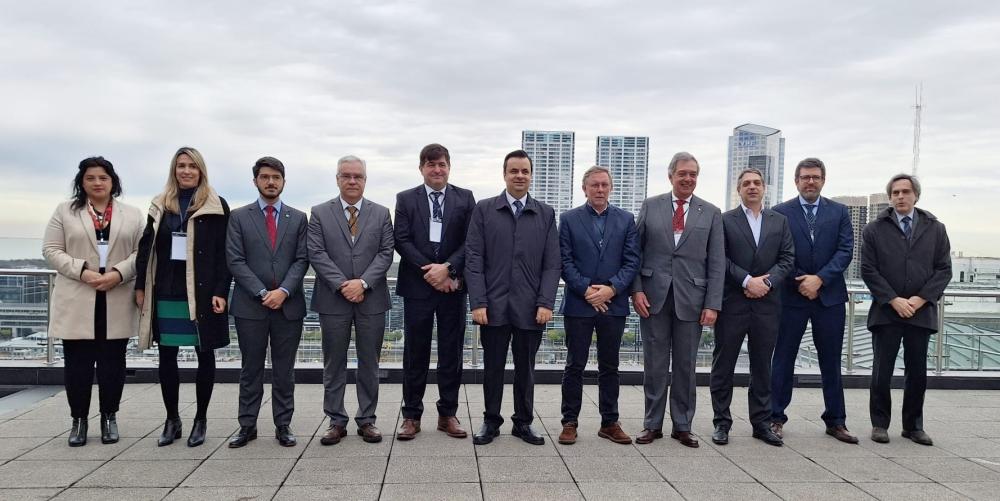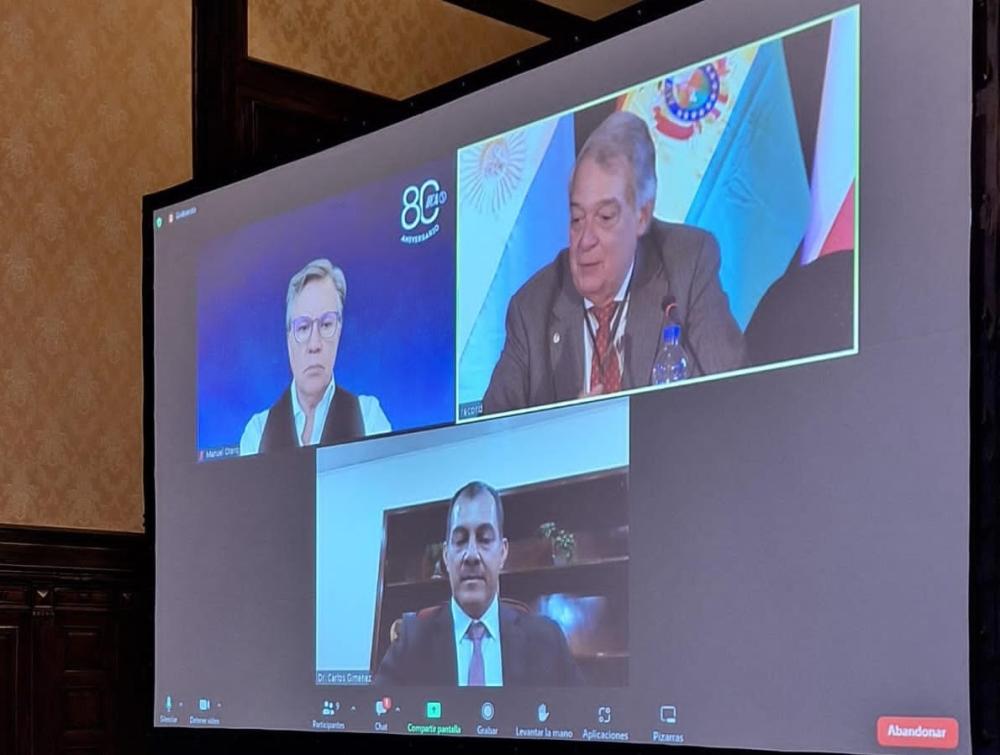Ministers of the Southern Agricultural Council (CAS): “The economic, social and environmental dimensions of production must be addressed in a balanced way”

Buenos Aires, August 28, 2023 (IICA). At a meeting in Buenos Aires, ministers and other senior agricultural officials from the member countries of the Southern Agricultural Council (CAS) agreed on the importance of food production being carried out in such a way to strike a balance among the three pillars of sustainability: the economic, social and environmental dimensions. The participants pointed out that the environmental requirements that the European Union intends to impose unilaterally for the importation of primary products should not hinder international trade or increase costs.
Participating in the meeting were the Minister of Livestock, Agriculture and Fisheries of Uruguay, and President pro-tempore of the CAS, Fernando Mattos; the Secretary for Agriculture, Livestock and Fisheries of Argentina, Juan José Bahillo; the Secretary for Trade and International Relations of the Ministry of Agriculture, Livestock and Supply (MAPA) of Brazil, Roberto Perosa; the National Director of the Office of Agrarian Studies and Policies (ODEPA) of Chile, Andrea García; and the Director of Planning of the Ministry of Rural Development and Land (MDRYT) of Bolivia, Blas Mamani.
The new Minister of Agriculture and Livestock of Paraguay, Carlos Giménez, greeted his colleagues from Asunción via videoconference and expressed appreciation for the work of the CAS. Also in attendance at the meeting were the Undersecretary for Political Coordination of the Argentine Ministry of Agriculture, Ariel Martínez, and Fernando Zelner, Assistant Secretary for Trade and International Relations of Brazil’s Ministry of Agriculture.
The Director General of the Inter-American Institute for Cooperation on Agriculture (IICA), Manuel Otero, was a virtual participant.
The CAS is the ministerial forum for consultation and the coordination of regional actions, composed of the ministers and secretaries of agriculture of the countries already mentioned. Its objective is to define the priorities of the agricultural agenda and adopt common positions on issues of regional interest. As part of its mission of facilitating collective action and integration, IICA operates the CAS’s technical secretariat.
Regional vision
The participants discussed the relationship between the CAS and MERCOSUR, with the aim of constructing a regional vision. They referred particularly to the issue of trade and the environment, and were agreed on the need to strengthen a unified position that represents the interests of the Southern Cone countries in their dealings with the European Union and the World Trade Organization (WTO). They also discussed the need to further develop measures that foster climate resilience in the face of the strong and increasingly frequent impact of extreme weather events that affect agricultural production.
The ministers and senior officials reaffirmed the CAS member countries’ commitment to responsible food production, with an emphasis on the preservation of natural resources and biodiversity. They also rejected any attempt to use environmental arguments to intensify protectionist measures, given that the agriculture sector is basically a victim of climate change and far from being the major contributor to it.

“Long before the world started talking about environmental issues, our grandparents in the countryside took care of its resources. We mustn’t let anyone blame us for the deterioration of the environment, and we have to be very firm about this,” said Minister Mattos.
Secretary Perosa stressed that developed countries had not fulfilled their pledges to provide financial support to developing countries for climate change mitigation and adaptation efforts.
During the meeting, the Argentine delegation made a presentation on trade and the environment. It was pointed out that the European Union has a biased vision of sustainable development, focused on the “environmental pillar,” which is different from the CAS’s vision, which seeks to strike a balance among the pillars of sustainability. It was also noted that agriculture was part of the solution to the challenges facing the planet, since it not only provides the food, fibers and ecosystem services that the world needs, but also generates employment, drives development, and strengthens rootedness in rural territories.
Minister Mattos also emphasized the importance of his CAS colleagues attending the next United Nations Climate Change Conference (COP 28), which is due to take place at the end of the year in the United Arab Emirates, in order to send a political signal of their unified stance and their rejection of the notion that agriculture in the Southern Cone bears much of the blame for climate change.
The meeting also included a presentation by the President of the Southern Cone Plant Health Committee (COSAVE), Diego Quiroga. The countries decided that the permanent secretariat of this regional phytosanitary cooperation body should be based in Buenos Aires.
The President of the Cooperative Program for the Development of Agrifood and Agroindustrial Technology in the Southern Cone (PROCISUR), Mariano Garmendia, presented the program’s strategic lines of action, focused on the sustainable intensification of agriculture, climate change, family farming, and institution building. PROCISUR is an institutional instrument for the integration and coordination of the national agricultural research institutes of Argentina, Brazil, Chile, Paraguay and Uruguay, and IICA. Specialist Pablo Mercuri, from Argentina’s INTA, also presented a report on the climate outlook for the Southern Cone, following the severe drought that has affected the region in recent years.
Marcos Pereda, from the Federation of Rural Associations of Mercosur (FARM), and Fernando López, from the Confederation of Family Producers’ Organizations of Mercosur (COPROFARM), represented the private sector.
More information:
Institutional Communication Division.
comunicacion.institucional@iica.int